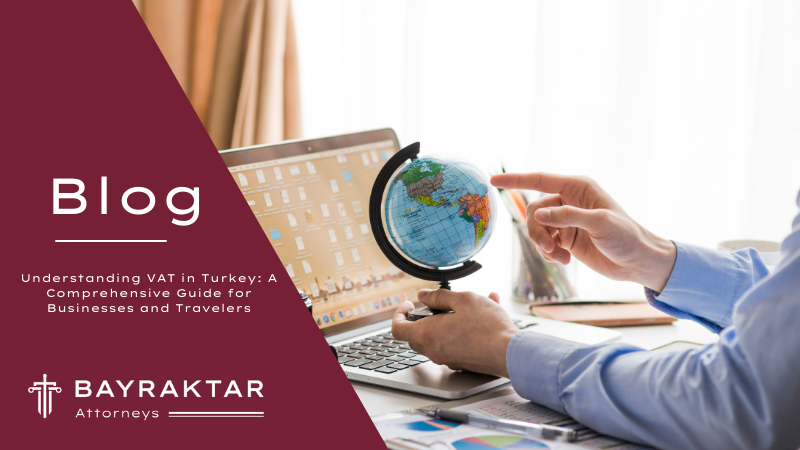
As global trade expands and international travel to Turkey continues to grow, understanding VAT in Turkey has become increasingly important for both businesses and travelers. Turkey’s dynamic economy and well-structured tax system make Value Added Tax (VAT) a central component of commercial and consumer transactions.
Although the Turkish VAT system largely aligns with the European VAT model, it operates under its own legal framework with distinct rates, exemptions, and compliance requirements. This comprehensive guide offers a clear legal perspective on VAT in Turkey, helping businesses and individuals navigate their obligations with confidence and accuracy.
What Is VAT in Turkey?
VAT in Turkey, known as Katma Değer Vergisi (KDV), is an indirect tax imposed on the supply of goods and services within Turkey, as well as on imported goods. While the tax burden ultimately falls on the end consumer, VAT is collected at each stage of the production and distribution chain.
Under Turkish VAT legislation, taxpayers are responsible for charging, collecting, and remitting VAT to the tax authorities in accordance with applicable rates and reporting rules. Understanding how VAT in Turkey applies to specific transactions is essential for legal compliance and accurate financial reporting.
VAT Rates in Turkey
The Turkish VAT system applies multiple rates depending on the nature of goods and services. Currently, VAT rates in Turkey fall into three primary categories:
Standard VAT Rate – 20%
Applied to most goods and services.Reduced VAT Rate – 10%
Applicable to basic food products, accommodation services, and certain essential services.Reduced VAT Rate – 1%
Applied to newspapers, magazines, selected agricultural products, and certain essential consumer goods.
Correctly identifying the applicable VAT rate is crucial, as misclassification can lead to tax assessments, penalties, and interest. By the way, do you know about the latest changes in Turkish VAT rate?

VAT Registration and Compliance in Turkey
Businesses conducting taxable activities in Turkey are generally required to register for VAT. VAT registration becomes mandatory once a business:
Performs taxable supplies in Turkey, or
Exceeds statutory thresholds, where applicable
Foreign companies operating in Turkey must also comply with Turkish VAT regulations, which may differ from EU practices in areas such as invoicing standards, reverse-charge mechanisms, and declaration procedures.
Once registered, businesses must:
File periodic VAT returns
Pay VAT liabilities on time
Maintain accurate accounting records
Failure to comply with VAT obligations in Turkey may result in administrative fines and tax audits.
VAT Refunds in Turkey for Businesses and Travelers
VAT Refunds for Businesses
Non-resident businesses that incur VAT expenses in Turkey but do not perform taxable supplies may be eligible for VAT refunds. These refunds typically relate to expenses such as accommodation, transportation, and professional services.
The refund process in Turkey can be procedurally complex and requires:
Complete and accurate documentation
Compliance with statutory deadlines
Proper submission through designated tax channels
Professional legal and tax assistance is often essential to ensure a successful refund claim.
VAT Refunds for Travelers
Travelers visiting Turkey may also benefit from VAT refunds on qualifying purchases. To be eligible:
Goods must be purchased from authorized retailers
Purchases must be exported within a prescribed period
Receipts and passports must be presented at customs upon departure
VAT refunds apply exclusively to goods taken out of Turkey and do not cover services consumed within the country.

The Impact of VAT in Turkey on Pricing and Accounting
VAT in Turkey has a direct effect on pricing structures and financial planning. For businesses, VAT must be carefully integrated into pricing strategies to remain competitive while maintaining profitability.
Accurate VAT accounting is critical for:
Cash-flow management
Regulatory compliance
Audit preparedness
For travelers, retail prices in Turkey generally include VAT, making awareness of refund opportunities particularly valuable for cost optimization.

Professional Legal Management of VAT in Turkey
Although VAT in Turkey may initially appear complex, a thorough understanding of its legal framework enables businesses to manage their tax obligations efficiently and allows travelers to make informed purchasing decisions.
With proper planning, accurate compliance, and professional guidance, VAT in Turkey can be navigated smoothly while minimizing risks and maximizing financial advantages.
Discover VAT refund processes for both businesses and travelers, ensuring optimal financial management. Navigate pricing impacts and accounting intricacies with confidence. For expert insights and seamless VAT management in Turkey, trust Bayraktar Attorneys. Contact us today to unlock your VAT potential in Turkey’s dynamic economy.
Recently Added Blogs



.png)
.png)
.png)
.png)
